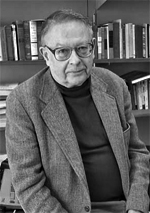Henry Farrell Should Know Better
Why Farrell's caricature of realist thought is incomplete, incorrect and downright silly.
 In the course of weighing in on a back-and-forth between Dan Drezner and Anne-Marie Slaughter, Henry Farrell writes that:
In the course of weighing in on a back-and-forth between Dan Drezner and Anne-Marie Slaughter, Henry Farrell writes that:
unlike many realists [Dan] acknowledges that other factors than the international system can shape state preferences.
I hope this is a willful caricature on Farrell’s part and he doesn’t actually think that actual realists believe the view he ascribes to them. In an (as-yet unpublished!) paper I presented at APSA last year, I went into detail about how structural realism fails, by definition, to predict much about what a unipolar power like the United States would do in terms of foreign policy. Lack of structural pressures means a lack of predictive power for realism. But in the course of doing so, I went to the trouble of going through Kenneth Waltz’s and others’ writings on the domestic and international sources of foreign policy. I thought a snip of that literature review may help show how wrong Farrell’s point is:
Critics wrongly accuse Waltz of arguing that the structure of the international system determines states’ foreign policies.1 In Theory of International Politics, Waltz explicitly allows for domestic factors to influence both national policies and international outcomes, but argues that under conditions of anarchy (with more than one great power), structural factors generally influence these processes more than do domestic ones.
Waltz consistently emphasized that domestic politics influence state behavior. In a 1967 article opposing the Vietnam War, Waltz judged that “the world balance has now tipped in America’s favor,” and that consequently “if the restraints of international politics press less closely, the question of internal restraint looms ever larger. To study the politics of peace, then, requires examination of domestic politics, especially the politics of the world’s most powerful nation."2 Later, Waltz wrote that “structures shape and shove. They do not determine behaviors and outcomes, not only because unit-level and structural causes interact, but also because the shaping and shoving of structures may be successfully resisted.”3
In a later work disavowing neorealism’s applicability as a theory of foreign policy, Waltz restated this claim: “an international-political theory can explain states’ behavior only when external pressures dominate the internal disposition of states, which seldom happens. When they do not, a theory of international politics needs help.”4 Partly as a consequence of this limitation, Waltz admitted that the only predictions his theory offers are “indeterminate” and “falsification is difficult.”5
I hope this will help put to bed the silly idea that any actual realists believe that “factors other than the international system cannot shape state preferences.” Realists are rarely as unfair to their opponents’ theories as the opponents are to theirs.
———
1 In 1992, for example, Fareed Zakaria claimed that neorealism holds that “systemic pressures determine states’ foreign policy behavior.” Fareed Zakaria, “Realism and Domestic Politics: A Review Essay,” International Security 17, no. 1 (Summer 1992): 180.
2 Kenneth N. Waltz, “The Politics of Peace,” International Studies Quarterly 11, no. 3 (September 1967): 202, 207. Emphasis added.
3 Kenneth N. Waltz, “Reflections on Theory of International Politics: A Response to My Critics,” in Robert E. Keohane, editor, Neorealism and Its Critics (New York: Columbia University Press, 1986), p. 343.
4 Kenneth N. Waltz, “International Politics Is Not Foreign Policy,” Security Studies 6, no. 1 (Autumn 1996): 57.
5 Waltz, Theory, p. 124.
